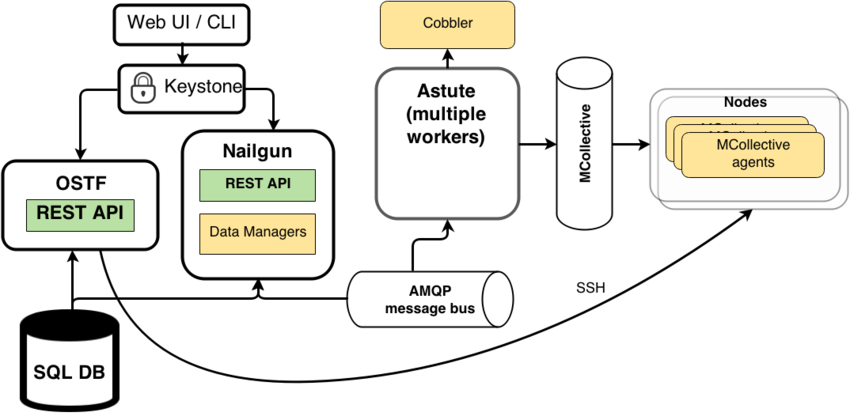Fuel$ j5 Q; e+ }: ~: z1 |- I

9 S$ j$ D% r- ^; O+ A7 q6 Y3 ~/ W8 }. \+ i- e& O3 g: O# Z8 ]
" l% X& ]5 y4 o3 k$ d C, z( |$ Z% c( h+ n O
目录
1 s6 n9 O9 D5 `4 P
) s0 K3 H5 E. e- R; c( h; aMission StatementTo streamline and accelerate the process of deploying, testing and maintaining various configurations of OpenStack at scale. People- PTL, ` i6 j# v9 W4 p J* M
- Vladimir Kuklin (aglarendil); F4 ?3 m" F V- x) u0 j
- Infrastructure Liaison
/ D2 S$ |# ~8 w; e2 |+ o- Ivan Remizov (iremizov)
- Igor Belikov (igorbelikov)+ ]/ C U/ p+ s g
6 m/ C0 U( ~$ \/ P9 i+ O: i
See the Team Structure policy document for more details on the internal organization and operation of the Fuel team. Fuel is an open source deployment and management tool for OpenStack. Developed as an OpenStack community effort, it provides an intuitive, GUI-driven experience for deployment and management of OpenStack, related community projects and plug-ins. Fuel brings consumer-grade simplicity to streamline and accelerate the otherwise time-consuming, often complex, and error-prone process of deploying, testing and maintaining various configuration flavors of OpenStack at scale. Unlike other platform-specific deployment or management utilities, Fuel is an upstream OpenStack project that focuses on automating the deployment and testing of OpenStack and a range of third-party options, so it’s not compromised by hard bundling or vendor lock-in. This installer has been battle-tested during 2013 in a number of OpenStack deployments on platforms like as Dell (C6220 & R320), HP (DL380), Supermicro (6027TR-HTRF), Lenovo ThinkServer (RD530) and Cisco UCS-C. The key features are: - hardware discovery
- hardware configuration in UI (networks & disk partitioning)
- ability to spin up and manage multiple OpenStack clusters
- support for non-HA and HA OpenStack deployment configurations
- pre-deployment checks and network validation
- post-deployment checks and running a set of tests for validating deployed OpenStack
- view logs in real-time through UI
- support for CentOS and Ubuntu, and it can be extended to support other distributions too
- support for multiple OpenStack distributions$ x: c. [9 I8 }' r: `6 ]
Mirantis uses Fuel as a part of their Openstack related solutions and they are our major contributor. For more details look at http://software.mirantis.com/If you would like to play with it in a demo environment, visit http://demo.fuel-infra.org:8000/ (login and passwords is 'admin'). This deployment emulates the provisioning process giving you a chance to see how the UI works without needing to install anything on your own hardware.  Fuel is not monolithic. It consists of several independent components. Some of those components are Fuel specific components, while others are third-party services like Cobbler, Puppet, Mcollective, etc. Some components can be reused separately from Fuel without any modifications, some will require little tweaks. - UI is single page application, written in JavaScript. It uses bootstrap and backbone frameworks underneath. Check out video which demonstrates UI and basic capabilities of Fuel of version 4.0 (this is Mirantis distribution version, which is different from the community by Mirantis logo only).
- Nailgun is the heart of the Fuel project. Nailgun like other Openstack projects is written in the Python programming language. It implements a REST API as well as deployment data management. It manages disk volumes, configuration data, network configuration data and any other environment specific data which are necessary for successful deployment. It has required orchestration logic to build instructions for provisioning and deployment in the right order. Nailgun uses a SQL database to store its data and AMQP service to interact with workers. Fuel CLI provides even more possible actions than the UI.
- Astute is another important component, which represents Nailgun's workers, and its function is to run certain actions according to the instructions provided by Nailgun. In fact, Astute is nothing more than just a layer which encapsulates all the details about interaction with a variety of services such as Cobbler, Puppet, shell scripts, etc. and provides universal asynchronous interface to those services. Depending on what we need to do we can either manage a service directly via its native protocol (for example the XML-RPC protocol is used for Cobbler) or we can use MCollective agents to perform specific tasks such as launching "puppet apply" on a remote node or running a script. Astute exchanges the data with Nailgun via AMQP.
- Cobbler is used as a provisioning service at the moment. There is a POC ready to move to Ironic, and a production version is being implemented.
- Puppet is our only deployment service at the moment. It would be possible to create MCollective agents to manage other configuration management frameworks, such as Chef, SaltStack, etc.
- MCollective agents allow us to perform specific tasks like hard drive clearing, network connectivity probing etc.
- OSTF (OpenStack Testing Framework, or Health Check) is a separate component, which can be easily removed and reused without Fuel. It implements post-deployment verification of OpenStack. Its main goal is to verify maximum functionality taking a minimum of time.
& O. R4 u ~8 o: l& N: B
Where to get FuelReleases
/ _) G1 T# s+ }+ S, Q; x" ]0 T2 P, q) V9 A4 ~
|
 |手机版|小黑屋|赛格电脑 华强北 电脑城 南山赛格 龙岗电子世界 龙华电脑城 沙井电脑城 松岗电脑城 pc4g.com
( 粤ICP备16039863号 )
|手机版|小黑屋|赛格电脑 华强北 电脑城 南山赛格 龙岗电子世界 龙华电脑城 沙井电脑城 松岗电脑城 pc4g.com
( 粤ICP备16039863号 )